Portfolio: Skills and Development in Health and Social Care
VerifiedAdded on 2020/11/23
|16
|5235
|363
Portfolio
AI Summary
This portfolio provides an overview of personal and professional development skills relevant to the health and social care sector. It includes a SWOT analysis to assess strengths, weaknesses, opportunities, and threats, along with an examination of key skills such as academic, professional, and employability skills. The portfolio also explores short and long-term career visions, research and learning styles (VARK model), and potential roles. It discusses the importance of participating in meetings and utilizing feedback for improvement, as well as the benefits of a 360-degree review and a personal development plan. The document emphasizes the importance of continuous skill enhancement to meet market needs and adapt to the dynamic nature of the health and social care industry.

PORTFOLIO
Paraphrase This Document
Need a fresh take? Get an instant paraphrase of this document with our AI Paraphraser
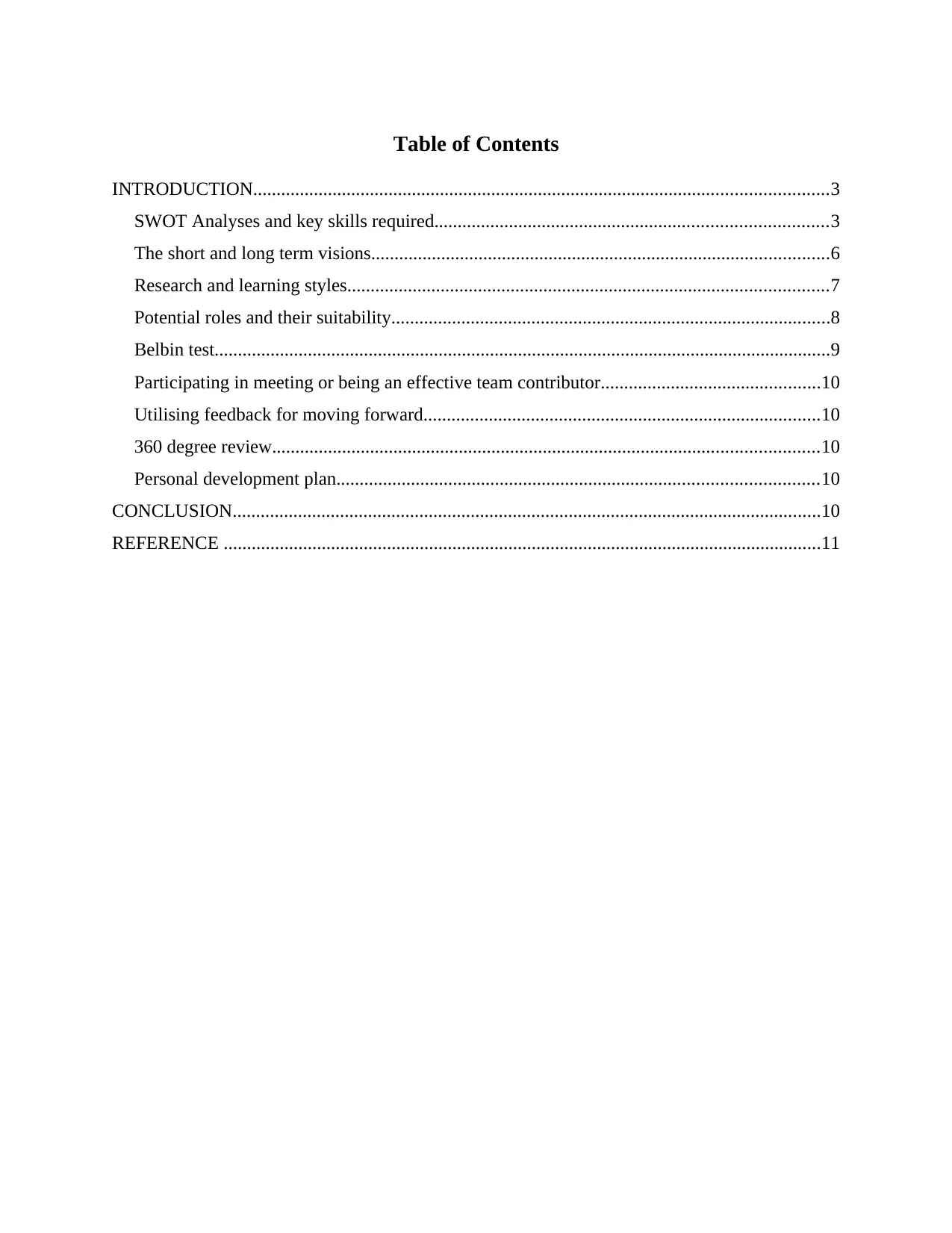
Table of Contents
INTRODUCTION...........................................................................................................................3
SWOT Analyses and key skills required....................................................................................3
The short and long term visions..................................................................................................6
Research and learning styles.......................................................................................................7
Potential roles and their suitability..............................................................................................8
Belbin test....................................................................................................................................9
Participating in meeting or being an effective team contributor...............................................10
Utilising feedback for moving forward.....................................................................................10
360 degree review.....................................................................................................................10
Personal development plan.......................................................................................................10
CONCLUSION..............................................................................................................................10
REFERENCE ................................................................................................................................11
INTRODUCTION...........................................................................................................................3
SWOT Analyses and key skills required....................................................................................3
The short and long term visions..................................................................................................6
Research and learning styles.......................................................................................................7
Potential roles and their suitability..............................................................................................8
Belbin test....................................................................................................................................9
Participating in meeting or being an effective team contributor...............................................10
Utilising feedback for moving forward.....................................................................................10
360 degree review.....................................................................................................................10
Personal development plan.......................................................................................................10
CONCLUSION..............................................................................................................................10
REFERENCE ................................................................................................................................11
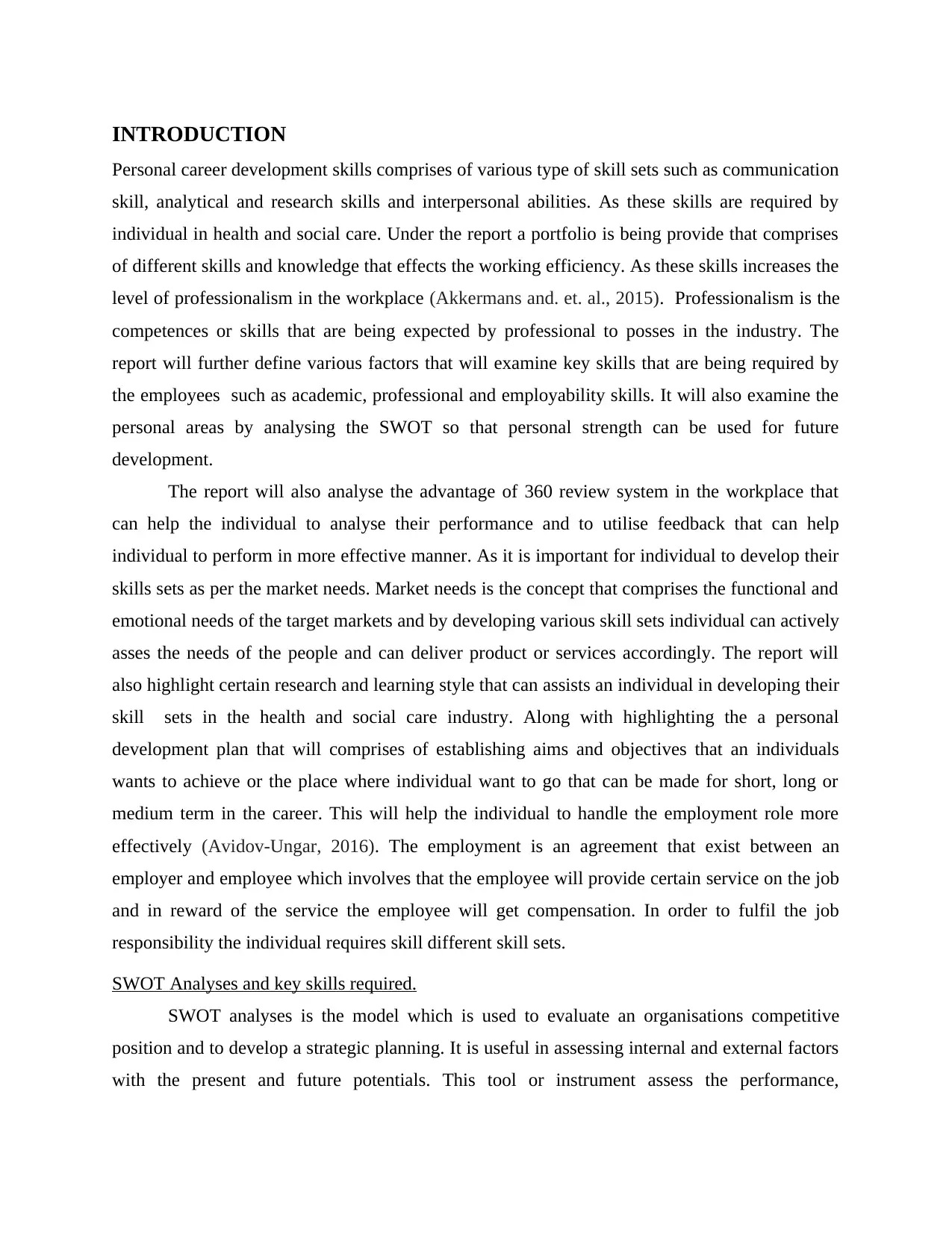
INTRODUCTION
Personal career development skills comprises of various type of skill sets such as communication
skill, analytical and research skills and interpersonal abilities. As these skills are required by
individual in health and social care. Under the report a portfolio is being provide that comprises
of different skills and knowledge that effects the working efficiency. As these skills increases the
level of professionalism in the workplace (Akkermans and. et. al., 2015). Professionalism is the
competences or skills that are being expected by professional to posses in the industry. The
report will further define various factors that will examine key skills that are being required by
the employees such as academic, professional and employability skills. It will also examine the
personal areas by analysing the SWOT so that personal strength can be used for future
development.
The report will also analyse the advantage of 360 review system in the workplace that
can help the individual to analyse their performance and to utilise feedback that can help
individual to perform in more effective manner. As it is important for individual to develop their
skills sets as per the market needs. Market needs is the concept that comprises the functional and
emotional needs of the target markets and by developing various skill sets individual can actively
asses the needs of the people and can deliver product or services accordingly. The report will
also highlight certain research and learning style that can assists an individual in developing their
skill sets in the health and social care industry. Along with highlighting the a personal
development plan that will comprises of establishing aims and objectives that an individuals
wants to achieve or the place where individual want to go that can be made for short, long or
medium term in the career. This will help the individual to handle the employment role more
effectively (Avidov-Ungar, 2016). The employment is an agreement that exist between an
employer and employee which involves that the employee will provide certain service on the job
and in reward of the service the employee will get compensation. In order to fulfil the job
responsibility the individual requires skill different skill sets.
SWOT Analyses and key skills required.
SWOT analyses is the model which is used to evaluate an organisations competitive
position and to develop a strategic planning. It is useful in assessing internal and external factors
with the present and future potentials. This tool or instrument assess the performance,
Personal career development skills comprises of various type of skill sets such as communication
skill, analytical and research skills and interpersonal abilities. As these skills are required by
individual in health and social care. Under the report a portfolio is being provide that comprises
of different skills and knowledge that effects the working efficiency. As these skills increases the
level of professionalism in the workplace (Akkermans and. et. al., 2015). Professionalism is the
competences or skills that are being expected by professional to posses in the industry. The
report will further define various factors that will examine key skills that are being required by
the employees such as academic, professional and employability skills. It will also examine the
personal areas by analysing the SWOT so that personal strength can be used for future
development.
The report will also analyse the advantage of 360 review system in the workplace that
can help the individual to analyse their performance and to utilise feedback that can help
individual to perform in more effective manner. As it is important for individual to develop their
skills sets as per the market needs. Market needs is the concept that comprises the functional and
emotional needs of the target markets and by developing various skill sets individual can actively
asses the needs of the people and can deliver product or services accordingly. The report will
also highlight certain research and learning style that can assists an individual in developing their
skill sets in the health and social care industry. Along with highlighting the a personal
development plan that will comprises of establishing aims and objectives that an individuals
wants to achieve or the place where individual want to go that can be made for short, long or
medium term in the career. This will help the individual to handle the employment role more
effectively (Avidov-Ungar, 2016). The employment is an agreement that exist between an
employer and employee which involves that the employee will provide certain service on the job
and in reward of the service the employee will get compensation. In order to fulfil the job
responsibility the individual requires skill different skill sets.
SWOT Analyses and key skills required.
SWOT analyses is the model which is used to evaluate an organisations competitive
position and to develop a strategic planning. It is useful in assessing internal and external factors
with the present and future potentials. This tool or instrument assess the performance,
⊘ This is a preview!⊘
Do you want full access?
Subscribe today to unlock all pages.

Trusted by 1+ million students worldwide
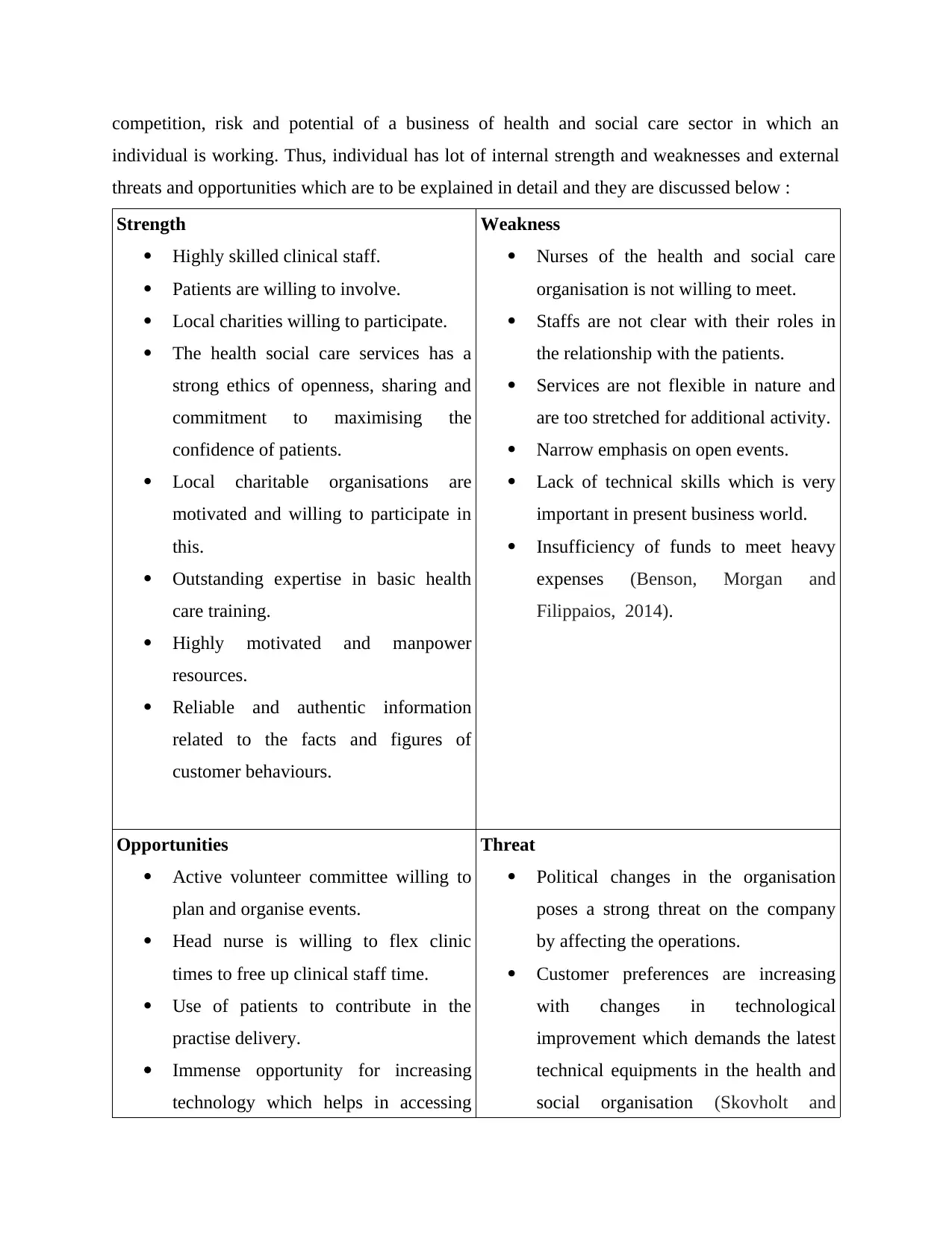
competition, risk and potential of a business of health and social care sector in which an
individual is working. Thus, individual has lot of internal strength and weaknesses and external
threats and opportunities which are to be explained in detail and they are discussed below :
Strength
Highly skilled clinical staff.
Patients are willing to involve.
Local charities willing to participate.
The health social care services has a
strong ethics of openness, sharing and
commitment to maximising the
confidence of patients.
Local charitable organisations are
motivated and willing to participate in
this.
Outstanding expertise in basic health
care training.
Highly motivated and manpower
resources.
Reliable and authentic information
related to the facts and figures of
customer behaviours.
Weakness
Nurses of the health and social care
organisation is not willing to meet.
Staffs are not clear with their roles in
the relationship with the patients.
Services are not flexible in nature and
are too stretched for additional activity.
Narrow emphasis on open events.
Lack of technical skills which is very
important in present business world.
Insufficiency of funds to meet heavy
expenses (Benson, Morgan and
Filippaios, 2014).
Opportunities
Active volunteer committee willing to
plan and organise events.
Head nurse is willing to flex clinic
times to free up clinical staff time.
Use of patients to contribute in the
practise delivery.
Immense opportunity for increasing
technology which helps in accessing
Threat
Political changes in the organisation
poses a strong threat on the company
by affecting the operations.
Customer preferences are increasing
with changes in technological
improvement which demands the latest
technical equipments in the health and
social organisation (Skovholt and
individual is working. Thus, individual has lot of internal strength and weaknesses and external
threats and opportunities which are to be explained in detail and they are discussed below :
Strength
Highly skilled clinical staff.
Patients are willing to involve.
Local charities willing to participate.
The health social care services has a
strong ethics of openness, sharing and
commitment to maximising the
confidence of patients.
Local charitable organisations are
motivated and willing to participate in
this.
Outstanding expertise in basic health
care training.
Highly motivated and manpower
resources.
Reliable and authentic information
related to the facts and figures of
customer behaviours.
Weakness
Nurses of the health and social care
organisation is not willing to meet.
Staffs are not clear with their roles in
the relationship with the patients.
Services are not flexible in nature and
are too stretched for additional activity.
Narrow emphasis on open events.
Lack of technical skills which is very
important in present business world.
Insufficiency of funds to meet heavy
expenses (Benson, Morgan and
Filippaios, 2014).
Opportunities
Active volunteer committee willing to
plan and organise events.
Head nurse is willing to flex clinic
times to free up clinical staff time.
Use of patients to contribute in the
practise delivery.
Immense opportunity for increasing
technology which helps in accessing
Threat
Political changes in the organisation
poses a strong threat on the company
by affecting the operations.
Customer preferences are increasing
with changes in technological
improvement which demands the latest
technical equipments in the health and
social organisation (Skovholt and
Paraphrase This Document
Need a fresh take? Get an instant paraphrase of this document with our AI Paraphraser
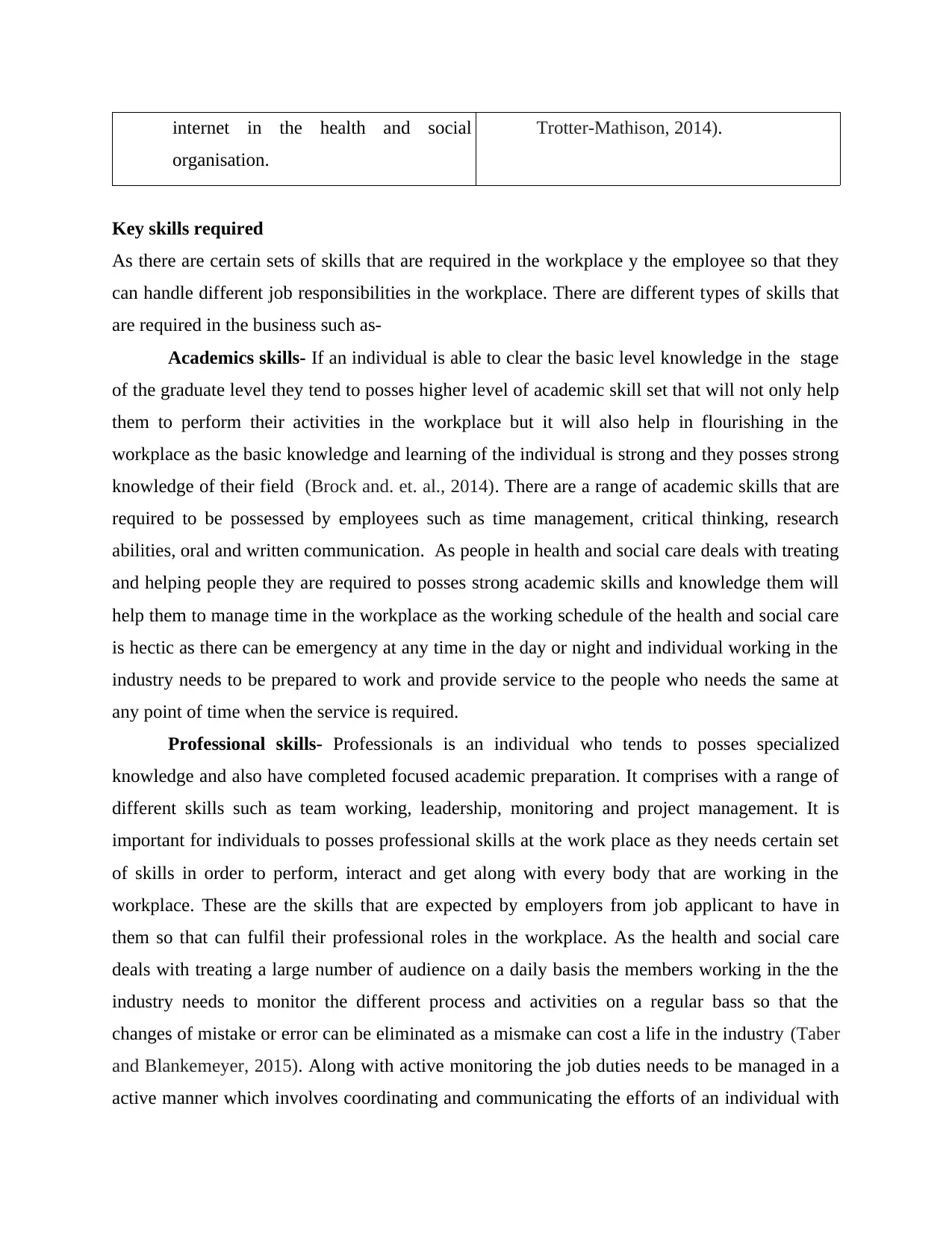
internet in the health and social
organisation.
Trotter-Mathison, 2014).
Key skills required
As there are certain sets of skills that are required in the workplace y the employee so that they
can handle different job responsibilities in the workplace. There are different types of skills that
are required in the business such as-
Academics skills- If an individual is able to clear the basic level knowledge in the stage
of the graduate level they tend to posses higher level of academic skill set that will not only help
them to perform their activities in the workplace but it will also help in flourishing in the
workplace as the basic knowledge and learning of the individual is strong and they posses strong
knowledge of their field (Brock and. et. al., 2014). There are a range of academic skills that are
required to be possessed by employees such as time management, critical thinking, research
abilities, oral and written communication. As people in health and social care deals with treating
and helping people they are required to posses strong academic skills and knowledge them will
help them to manage time in the workplace as the working schedule of the health and social care
is hectic as there can be emergency at any time in the day or night and individual working in the
industry needs to be prepared to work and provide service to the people who needs the same at
any point of time when the service is required.
Professional skills- Professionals is an individual who tends to posses specialized
knowledge and also have completed focused academic preparation. It comprises with a range of
different skills such as team working, leadership, monitoring and project management. It is
important for individuals to posses professional skills at the work place as they needs certain set
of skills in order to perform, interact and get along with every body that are working in the
workplace. These are the skills that are expected by employers from job applicant to have in
them so that can fulfil their professional roles in the workplace. As the health and social care
deals with treating a large number of audience on a daily basis the members working in the the
industry needs to monitor the different process and activities on a regular bass so that the
changes of mistake or error can be eliminated as a mismake can cost a life in the industry (Taber
and Blankemeyer, 2015). Along with active monitoring the job duties needs to be managed in a
active manner which involves coordinating and communicating the efforts of an individual with
organisation.
Trotter-Mathison, 2014).
Key skills required
As there are certain sets of skills that are required in the workplace y the employee so that they
can handle different job responsibilities in the workplace. There are different types of skills that
are required in the business such as-
Academics skills- If an individual is able to clear the basic level knowledge in the stage
of the graduate level they tend to posses higher level of academic skill set that will not only help
them to perform their activities in the workplace but it will also help in flourishing in the
workplace as the basic knowledge and learning of the individual is strong and they posses strong
knowledge of their field (Brock and. et. al., 2014). There are a range of academic skills that are
required to be possessed by employees such as time management, critical thinking, research
abilities, oral and written communication. As people in health and social care deals with treating
and helping people they are required to posses strong academic skills and knowledge them will
help them to manage time in the workplace as the working schedule of the health and social care
is hectic as there can be emergency at any time in the day or night and individual working in the
industry needs to be prepared to work and provide service to the people who needs the same at
any point of time when the service is required.
Professional skills- Professionals is an individual who tends to posses specialized
knowledge and also have completed focused academic preparation. It comprises with a range of
different skills such as team working, leadership, monitoring and project management. It is
important for individuals to posses professional skills at the work place as they needs certain set
of skills in order to perform, interact and get along with every body that are working in the
workplace. These are the skills that are expected by employers from job applicant to have in
them so that can fulfil their professional roles in the workplace. As the health and social care
deals with treating a large number of audience on a daily basis the members working in the the
industry needs to monitor the different process and activities on a regular bass so that the
changes of mistake or error can be eliminated as a mismake can cost a life in the industry (Taber
and Blankemeyer, 2015). Along with active monitoring the job duties needs to be managed in a
active manner which involves coordinating and communicating the efforts of an individual with
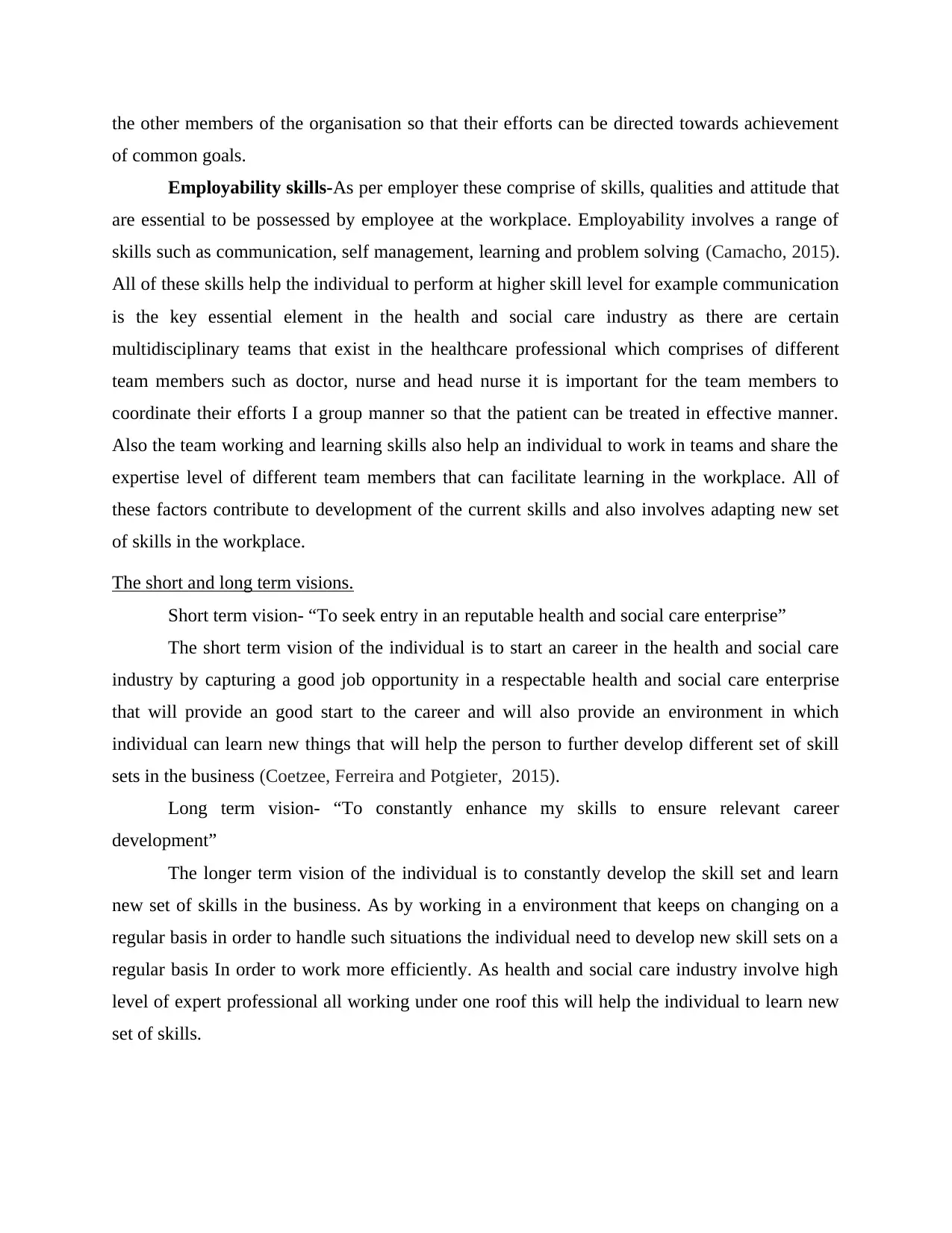
the other members of the organisation so that their efforts can be directed towards achievement
of common goals.
Employability skills-As per employer these comprise of skills, qualities and attitude that
are essential to be possessed by employee at the workplace. Employability involves a range of
skills such as communication, self management, learning and problem solving (Camacho, 2015).
All of these skills help the individual to perform at higher skill level for example communication
is the key essential element in the health and social care industry as there are certain
multidisciplinary teams that exist in the healthcare professional which comprises of different
team members such as doctor, nurse and head nurse it is important for the team members to
coordinate their efforts I a group manner so that the patient can be treated in effective manner.
Also the team working and learning skills also help an individual to work in teams and share the
expertise level of different team members that can facilitate learning in the workplace. All of
these factors contribute to development of the current skills and also involves adapting new set
of skills in the workplace.
The short and long term visions.
Short term vision- “To seek entry in an reputable health and social care enterprise”
The short term vision of the individual is to start an career in the health and social care
industry by capturing a good job opportunity in a respectable health and social care enterprise
that will provide an good start to the career and will also provide an environment in which
individual can learn new things that will help the person to further develop different set of skill
sets in the business (Coetzee, Ferreira and Potgieter, 2015).
Long term vision- “To constantly enhance my skills to ensure relevant career
development”
The longer term vision of the individual is to constantly develop the skill set and learn
new set of skills in the business. As by working in a environment that keeps on changing on a
regular basis in order to handle such situations the individual need to develop new skill sets on a
regular basis In order to work more efficiently. As health and social care industry involve high
level of expert professional all working under one roof this will help the individual to learn new
set of skills.
of common goals.
Employability skills-As per employer these comprise of skills, qualities and attitude that
are essential to be possessed by employee at the workplace. Employability involves a range of
skills such as communication, self management, learning and problem solving (Camacho, 2015).
All of these skills help the individual to perform at higher skill level for example communication
is the key essential element in the health and social care industry as there are certain
multidisciplinary teams that exist in the healthcare professional which comprises of different
team members such as doctor, nurse and head nurse it is important for the team members to
coordinate their efforts I a group manner so that the patient can be treated in effective manner.
Also the team working and learning skills also help an individual to work in teams and share the
expertise level of different team members that can facilitate learning in the workplace. All of
these factors contribute to development of the current skills and also involves adapting new set
of skills in the workplace.
The short and long term visions.
Short term vision- “To seek entry in an reputable health and social care enterprise”
The short term vision of the individual is to start an career in the health and social care
industry by capturing a good job opportunity in a respectable health and social care enterprise
that will provide an good start to the career and will also provide an environment in which
individual can learn new things that will help the person to further develop different set of skill
sets in the business (Coetzee, Ferreira and Potgieter, 2015).
Long term vision- “To constantly enhance my skills to ensure relevant career
development”
The longer term vision of the individual is to constantly develop the skill set and learn
new set of skills in the business. As by working in a environment that keeps on changing on a
regular basis in order to handle such situations the individual need to develop new skill sets on a
regular basis In order to work more efficiently. As health and social care industry involve high
level of expert professional all working under one roof this will help the individual to learn new
set of skills.
⊘ This is a preview!⊘
Do you want full access?
Subscribe today to unlock all pages.

Trusted by 1+ million students worldwide
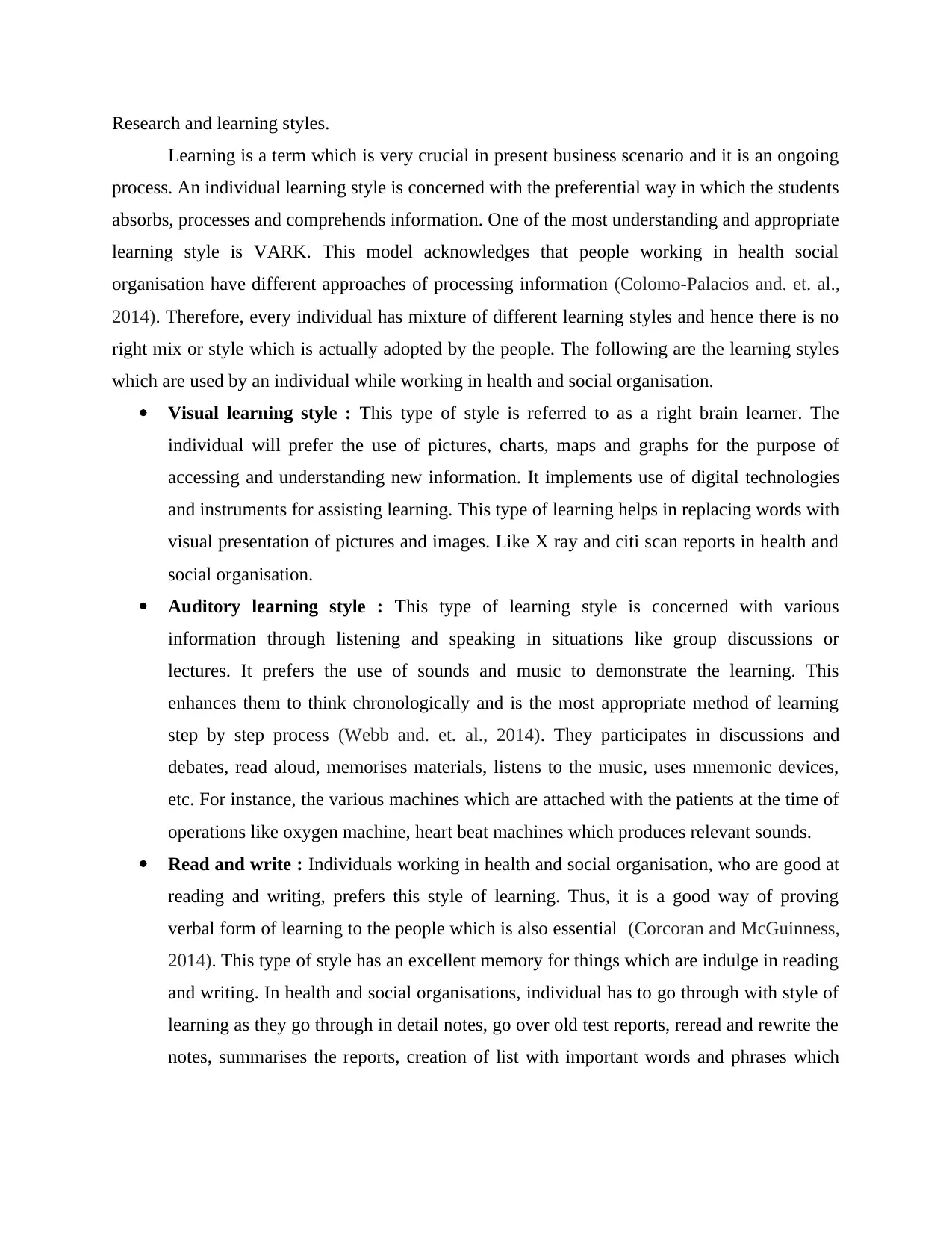
Research and learning styles.
Learning is a term which is very crucial in present business scenario and it is an ongoing
process. An individual learning style is concerned with the preferential way in which the students
absorbs, processes and comprehends information. One of the most understanding and appropriate
learning style is VARK. This model acknowledges that people working in health social
organisation have different approaches of processing information (Colomo‐Palacios and. et. al.,
2014). Therefore, every individual has mixture of different learning styles and hence there is no
right mix or style which is actually adopted by the people. The following are the learning styles
which are used by an individual while working in health and social organisation.
Visual learning style : This type of style is referred to as a right brain learner. The
individual will prefer the use of pictures, charts, maps and graphs for the purpose of
accessing and understanding new information. It implements use of digital technologies
and instruments for assisting learning. This type of learning helps in replacing words with
visual presentation of pictures and images. Like X ray and citi scan reports in health and
social organisation.
Auditory learning style : This type of learning style is concerned with various
information through listening and speaking in situations like group discussions or
lectures. It prefers the use of sounds and music to demonstrate the learning. This
enhances them to think chronologically and is the most appropriate method of learning
step by step process (Webb and. et. al., 2014). They participates in discussions and
debates, read aloud, memorises materials, listens to the music, uses mnemonic devices,
etc. For instance, the various machines which are attached with the patients at the time of
operations like oxygen machine, heart beat machines which produces relevant sounds.
Read and write : Individuals working in health and social organisation, who are good at
reading and writing, prefers this style of learning. Thus, it is a good way of proving
verbal form of learning to the people which is also essential (Corcoran and McGuinness,
2014). This type of style has an excellent memory for things which are indulge in reading
and writing. In health and social organisations, individual has to go through with style of
learning as they go through in detail notes, go over old test reports, reread and rewrite the
notes, summarises the reports, creation of list with important words and phrases which
Learning is a term which is very crucial in present business scenario and it is an ongoing
process. An individual learning style is concerned with the preferential way in which the students
absorbs, processes and comprehends information. One of the most understanding and appropriate
learning style is VARK. This model acknowledges that people working in health social
organisation have different approaches of processing information (Colomo‐Palacios and. et. al.,
2014). Therefore, every individual has mixture of different learning styles and hence there is no
right mix or style which is actually adopted by the people. The following are the learning styles
which are used by an individual while working in health and social organisation.
Visual learning style : This type of style is referred to as a right brain learner. The
individual will prefer the use of pictures, charts, maps and graphs for the purpose of
accessing and understanding new information. It implements use of digital technologies
and instruments for assisting learning. This type of learning helps in replacing words with
visual presentation of pictures and images. Like X ray and citi scan reports in health and
social organisation.
Auditory learning style : This type of learning style is concerned with various
information through listening and speaking in situations like group discussions or
lectures. It prefers the use of sounds and music to demonstrate the learning. This
enhances them to think chronologically and is the most appropriate method of learning
step by step process (Webb and. et. al., 2014). They participates in discussions and
debates, read aloud, memorises materials, listens to the music, uses mnemonic devices,
etc. For instance, the various machines which are attached with the patients at the time of
operations like oxygen machine, heart beat machines which produces relevant sounds.
Read and write : Individuals working in health and social organisation, who are good at
reading and writing, prefers this style of learning. Thus, it is a good way of proving
verbal form of learning to the people which is also essential (Corcoran and McGuinness,
2014). This type of style has an excellent memory for things which are indulge in reading
and writing. In health and social organisations, individual has to go through with style of
learning as they go through in detail notes, go over old test reports, reread and rewrite the
notes, summarises the reports, creation of list with important words and phrases which
Paraphrase This Document
Need a fresh take? Get an instant paraphrase of this document with our AI Paraphraser
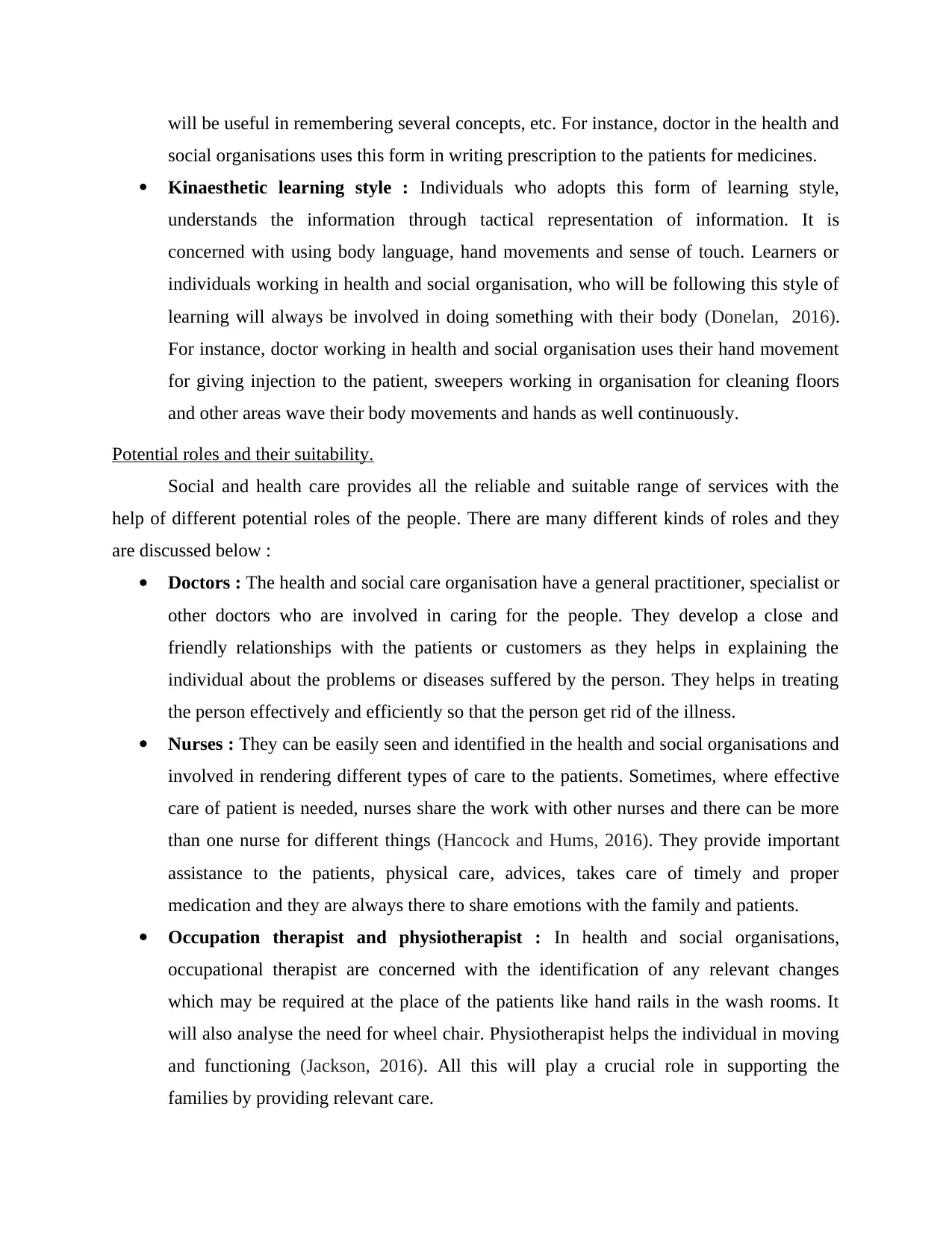
will be useful in remembering several concepts, etc. For instance, doctor in the health and
social organisations uses this form in writing prescription to the patients for medicines.
Kinaesthetic learning style : Individuals who adopts this form of learning style,
understands the information through tactical representation of information. It is
concerned with using body language, hand movements and sense of touch. Learners or
individuals working in health and social organisation, who will be following this style of
learning will always be involved in doing something with their body (Donelan, 2016).
For instance, doctor working in health and social organisation uses their hand movement
for giving injection to the patient, sweepers working in organisation for cleaning floors
and other areas wave their body movements and hands as well continuously.
Potential roles and their suitability.
Social and health care provides all the reliable and suitable range of services with the
help of different potential roles of the people. There are many different kinds of roles and they
are discussed below :
Doctors : The health and social care organisation have a general practitioner, specialist or
other doctors who are involved in caring for the people. They develop a close and
friendly relationships with the patients or customers as they helps in explaining the
individual about the problems or diseases suffered by the person. They helps in treating
the person effectively and efficiently so that the person get rid of the illness.
Nurses : They can be easily seen and identified in the health and social organisations and
involved in rendering different types of care to the patients. Sometimes, where effective
care of patient is needed, nurses share the work with other nurses and there can be more
than one nurse for different things (Hancock and Hums, 2016). They provide important
assistance to the patients, physical care, advices, takes care of timely and proper
medication and they are always there to share emotions with the family and patients.
Occupation therapist and physiotherapist : In health and social organisations,
occupational therapist are concerned with the identification of any relevant changes
which may be required at the place of the patients like hand rails in the wash rooms. It
will also analyse the need for wheel chair. Physiotherapist helps the individual in moving
and functioning (Jackson, 2016). All this will play a crucial role in supporting the
families by providing relevant care.
social organisations uses this form in writing prescription to the patients for medicines.
Kinaesthetic learning style : Individuals who adopts this form of learning style,
understands the information through tactical representation of information. It is
concerned with using body language, hand movements and sense of touch. Learners or
individuals working in health and social organisation, who will be following this style of
learning will always be involved in doing something with their body (Donelan, 2016).
For instance, doctor working in health and social organisation uses their hand movement
for giving injection to the patient, sweepers working in organisation for cleaning floors
and other areas wave their body movements and hands as well continuously.
Potential roles and their suitability.
Social and health care provides all the reliable and suitable range of services with the
help of different potential roles of the people. There are many different kinds of roles and they
are discussed below :
Doctors : The health and social care organisation have a general practitioner, specialist or
other doctors who are involved in caring for the people. They develop a close and
friendly relationships with the patients or customers as they helps in explaining the
individual about the problems or diseases suffered by the person. They helps in treating
the person effectively and efficiently so that the person get rid of the illness.
Nurses : They can be easily seen and identified in the health and social organisations and
involved in rendering different types of care to the patients. Sometimes, where effective
care of patient is needed, nurses share the work with other nurses and there can be more
than one nurse for different things (Hancock and Hums, 2016). They provide important
assistance to the patients, physical care, advices, takes care of timely and proper
medication and they are always there to share emotions with the family and patients.
Occupation therapist and physiotherapist : In health and social organisations,
occupational therapist are concerned with the identification of any relevant changes
which may be required at the place of the patients like hand rails in the wash rooms. It
will also analyse the need for wheel chair. Physiotherapist helps the individual in moving
and functioning (Jackson, 2016). All this will play a crucial role in supporting the
families by providing relevant care.
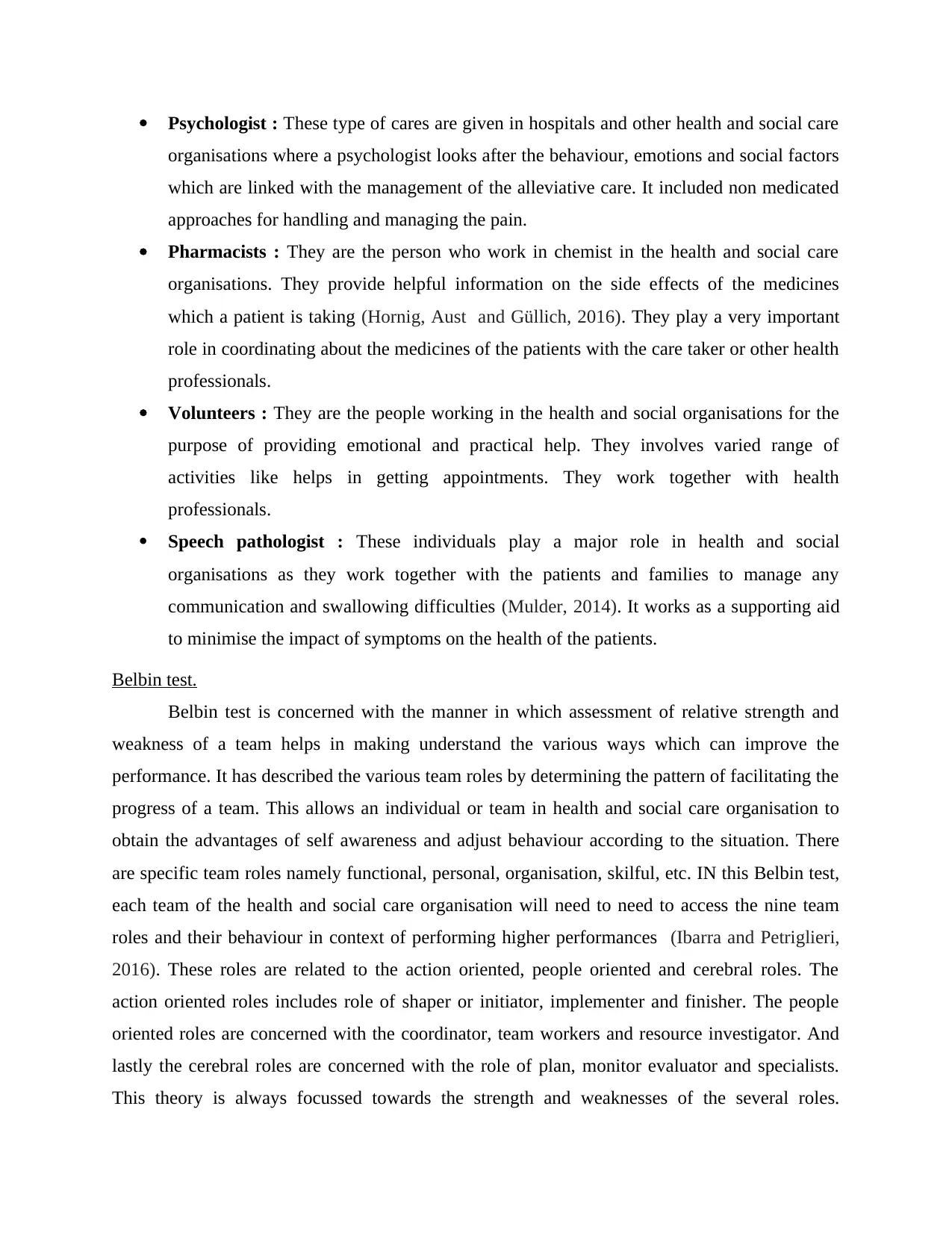
Psychologist : These type of cares are given in hospitals and other health and social care
organisations where a psychologist looks after the behaviour, emotions and social factors
which are linked with the management of the alleviative care. It included non medicated
approaches for handling and managing the pain.
Pharmacists : They are the person who work in chemist in the health and social care
organisations. They provide helpful information on the side effects of the medicines
which a patient is taking (Hornig, Aust and Güllich, 2016). They play a very important
role in coordinating about the medicines of the patients with the care taker or other health
professionals.
Volunteers : They are the people working in the health and social organisations for the
purpose of providing emotional and practical help. They involves varied range of
activities like helps in getting appointments. They work together with health
professionals.
Speech pathologist : These individuals play a major role in health and social
organisations as they work together with the patients and families to manage any
communication and swallowing difficulties (Mulder, 2014). It works as a supporting aid
to minimise the impact of symptoms on the health of the patients.
Belbin test.
Belbin test is concerned with the manner in which assessment of relative strength and
weakness of a team helps in making understand the various ways which can improve the
performance. It has described the various team roles by determining the pattern of facilitating the
progress of a team. This allows an individual or team in health and social care organisation to
obtain the advantages of self awareness and adjust behaviour according to the situation. There
are specific team roles namely functional, personal, organisation, skilful, etc. IN this Belbin test,
each team of the health and social care organisation will need to need to access the nine team
roles and their behaviour in context of performing higher performances (Ibarra and Petriglieri,
2016). These roles are related to the action oriented, people oriented and cerebral roles. The
action oriented roles includes role of shaper or initiator, implementer and finisher. The people
oriented roles are concerned with the coordinator, team workers and resource investigator. And
lastly the cerebral roles are concerned with the role of plan, monitor evaluator and specialists.
This theory is always focussed towards the strength and weaknesses of the several roles.
organisations where a psychologist looks after the behaviour, emotions and social factors
which are linked with the management of the alleviative care. It included non medicated
approaches for handling and managing the pain.
Pharmacists : They are the person who work in chemist in the health and social care
organisations. They provide helpful information on the side effects of the medicines
which a patient is taking (Hornig, Aust and Güllich, 2016). They play a very important
role in coordinating about the medicines of the patients with the care taker or other health
professionals.
Volunteers : They are the people working in the health and social organisations for the
purpose of providing emotional and practical help. They involves varied range of
activities like helps in getting appointments. They work together with health
professionals.
Speech pathologist : These individuals play a major role in health and social
organisations as they work together with the patients and families to manage any
communication and swallowing difficulties (Mulder, 2014). It works as a supporting aid
to minimise the impact of symptoms on the health of the patients.
Belbin test.
Belbin test is concerned with the manner in which assessment of relative strength and
weakness of a team helps in making understand the various ways which can improve the
performance. It has described the various team roles by determining the pattern of facilitating the
progress of a team. This allows an individual or team in health and social care organisation to
obtain the advantages of self awareness and adjust behaviour according to the situation. There
are specific team roles namely functional, personal, organisation, skilful, etc. IN this Belbin test,
each team of the health and social care organisation will need to need to access the nine team
roles and their behaviour in context of performing higher performances (Ibarra and Petriglieri,
2016). These roles are related to the action oriented, people oriented and cerebral roles. The
action oriented roles includes role of shaper or initiator, implementer and finisher. The people
oriented roles are concerned with the coordinator, team workers and resource investigator. And
lastly the cerebral roles are concerned with the role of plan, monitor evaluator and specialists.
This theory is always focussed towards the strength and weaknesses of the several roles.
⊘ This is a preview!⊘
Do you want full access?
Subscribe today to unlock all pages.

Trusted by 1+ million students worldwide
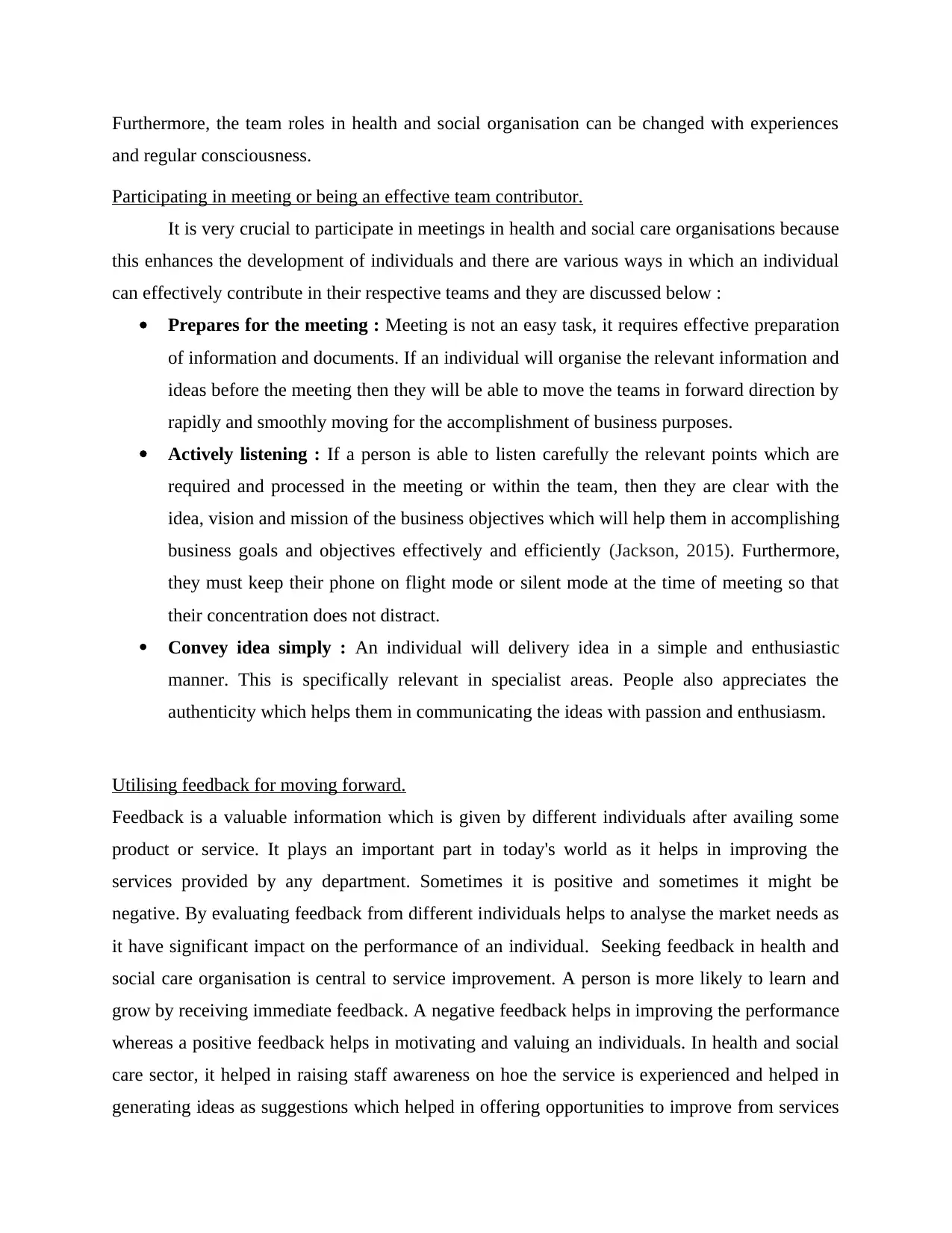
Furthermore, the team roles in health and social organisation can be changed with experiences
and regular consciousness.
Participating in meeting or being an effective team contributor.
It is very crucial to participate in meetings in health and social care organisations because
this enhances the development of individuals and there are various ways in which an individual
can effectively contribute in their respective teams and they are discussed below :
Prepares for the meeting : Meeting is not an easy task, it requires effective preparation
of information and documents. If an individual will organise the relevant information and
ideas before the meeting then they will be able to move the teams in forward direction by
rapidly and smoothly moving for the accomplishment of business purposes.
Actively listening : If a person is able to listen carefully the relevant points which are
required and processed in the meeting or within the team, then they are clear with the
idea, vision and mission of the business objectives which will help them in accomplishing
business goals and objectives effectively and efficiently (Jackson, 2015). Furthermore,
they must keep their phone on flight mode or silent mode at the time of meeting so that
their concentration does not distract.
Convey idea simply : An individual will delivery idea in a simple and enthusiastic
manner. This is specifically relevant in specialist areas. People also appreciates the
authenticity which helps them in communicating the ideas with passion and enthusiasm.
Utilising feedback for moving forward.
Feedback is a valuable information which is given by different individuals after availing some
product or service. It plays an important part in today's world as it helps in improving the
services provided by any department. Sometimes it is positive and sometimes it might be
negative. By evaluating feedback from different individuals helps to analyse the market needs as
it have significant impact on the performance of an individual. Seeking feedback in health and
social care organisation is central to service improvement. A person is more likely to learn and
grow by receiving immediate feedback. A negative feedback helps in improving the performance
whereas a positive feedback helps in motivating and valuing an individuals. In health and social
care sector, it helped in raising staff awareness on hoe the service is experienced and helped in
generating ideas as suggestions which helped in offering opportunities to improve from services
and regular consciousness.
Participating in meeting or being an effective team contributor.
It is very crucial to participate in meetings in health and social care organisations because
this enhances the development of individuals and there are various ways in which an individual
can effectively contribute in their respective teams and they are discussed below :
Prepares for the meeting : Meeting is not an easy task, it requires effective preparation
of information and documents. If an individual will organise the relevant information and
ideas before the meeting then they will be able to move the teams in forward direction by
rapidly and smoothly moving for the accomplishment of business purposes.
Actively listening : If a person is able to listen carefully the relevant points which are
required and processed in the meeting or within the team, then they are clear with the
idea, vision and mission of the business objectives which will help them in accomplishing
business goals and objectives effectively and efficiently (Jackson, 2015). Furthermore,
they must keep their phone on flight mode or silent mode at the time of meeting so that
their concentration does not distract.
Convey idea simply : An individual will delivery idea in a simple and enthusiastic
manner. This is specifically relevant in specialist areas. People also appreciates the
authenticity which helps them in communicating the ideas with passion and enthusiasm.
Utilising feedback for moving forward.
Feedback is a valuable information which is given by different individuals after availing some
product or service. It plays an important part in today's world as it helps in improving the
services provided by any department. Sometimes it is positive and sometimes it might be
negative. By evaluating feedback from different individuals helps to analyse the market needs as
it have significant impact on the performance of an individual. Seeking feedback in health and
social care organisation is central to service improvement. A person is more likely to learn and
grow by receiving immediate feedback. A negative feedback helps in improving the performance
whereas a positive feedback helps in motivating and valuing an individuals. In health and social
care sector, it helped in raising staff awareness on hoe the service is experienced and helped in
generating ideas as suggestions which helped in offering opportunities to improve from services
Paraphrase This Document
Need a fresh take? Get an instant paraphrase of this document with our AI Paraphraser
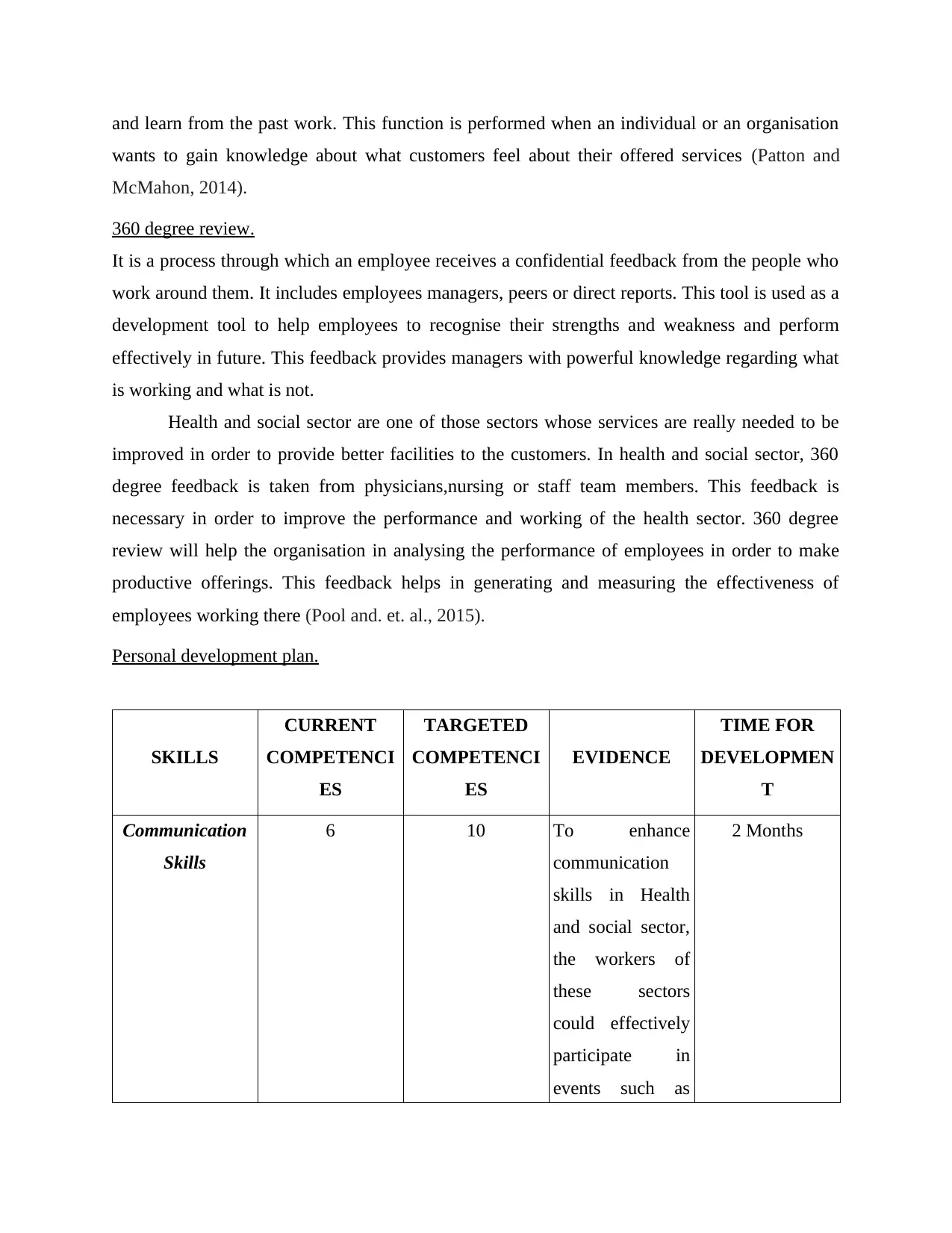
and learn from the past work. This function is performed when an individual or an organisation
wants to gain knowledge about what customers feel about their offered services (Patton and
McMahon, 2014).
360 degree review.
It is a process through which an employee receives a confidential feedback from the people who
work around them. It includes employees managers, peers or direct reports. This tool is used as a
development tool to help employees to recognise their strengths and weakness and perform
effectively in future. This feedback provides managers with powerful knowledge regarding what
is working and what is not.
Health and social sector are one of those sectors whose services are really needed to be
improved in order to provide better facilities to the customers. In health and social sector, 360
degree feedback is taken from physicians,nursing or staff team members. This feedback is
necessary in order to improve the performance and working of the health sector. 360 degree
review will help the organisation in analysing the performance of employees in order to make
productive offerings. This feedback helps in generating and measuring the effectiveness of
employees working there (Pool and. et. al., 2015).
Personal development plan.
SKILLS
CURRENT
COMPETENCI
ES
TARGETED
COMPETENCI
ES
EVIDENCE
TIME FOR
DEVELOPMEN
T
Communication
Skills
6 10 To enhance
communication
skills in Health
and social sector,
the workers of
these sectors
could effectively
participate in
events such as
2 Months
wants to gain knowledge about what customers feel about their offered services (Patton and
McMahon, 2014).
360 degree review.
It is a process through which an employee receives a confidential feedback from the people who
work around them. It includes employees managers, peers or direct reports. This tool is used as a
development tool to help employees to recognise their strengths and weakness and perform
effectively in future. This feedback provides managers with powerful knowledge regarding what
is working and what is not.
Health and social sector are one of those sectors whose services are really needed to be
improved in order to provide better facilities to the customers. In health and social sector, 360
degree feedback is taken from physicians,nursing or staff team members. This feedback is
necessary in order to improve the performance and working of the health sector. 360 degree
review will help the organisation in analysing the performance of employees in order to make
productive offerings. This feedback helps in generating and measuring the effectiveness of
employees working there (Pool and. et. al., 2015).
Personal development plan.
SKILLS
CURRENT
COMPETENCI
ES
TARGETED
COMPETENCI
ES
EVIDENCE
TIME FOR
DEVELOPMEN
T
Communication
Skills
6 10 To enhance
communication
skills in Health
and social sector,
the workers of
these sectors
could effectively
participate in
events such as
2 Months
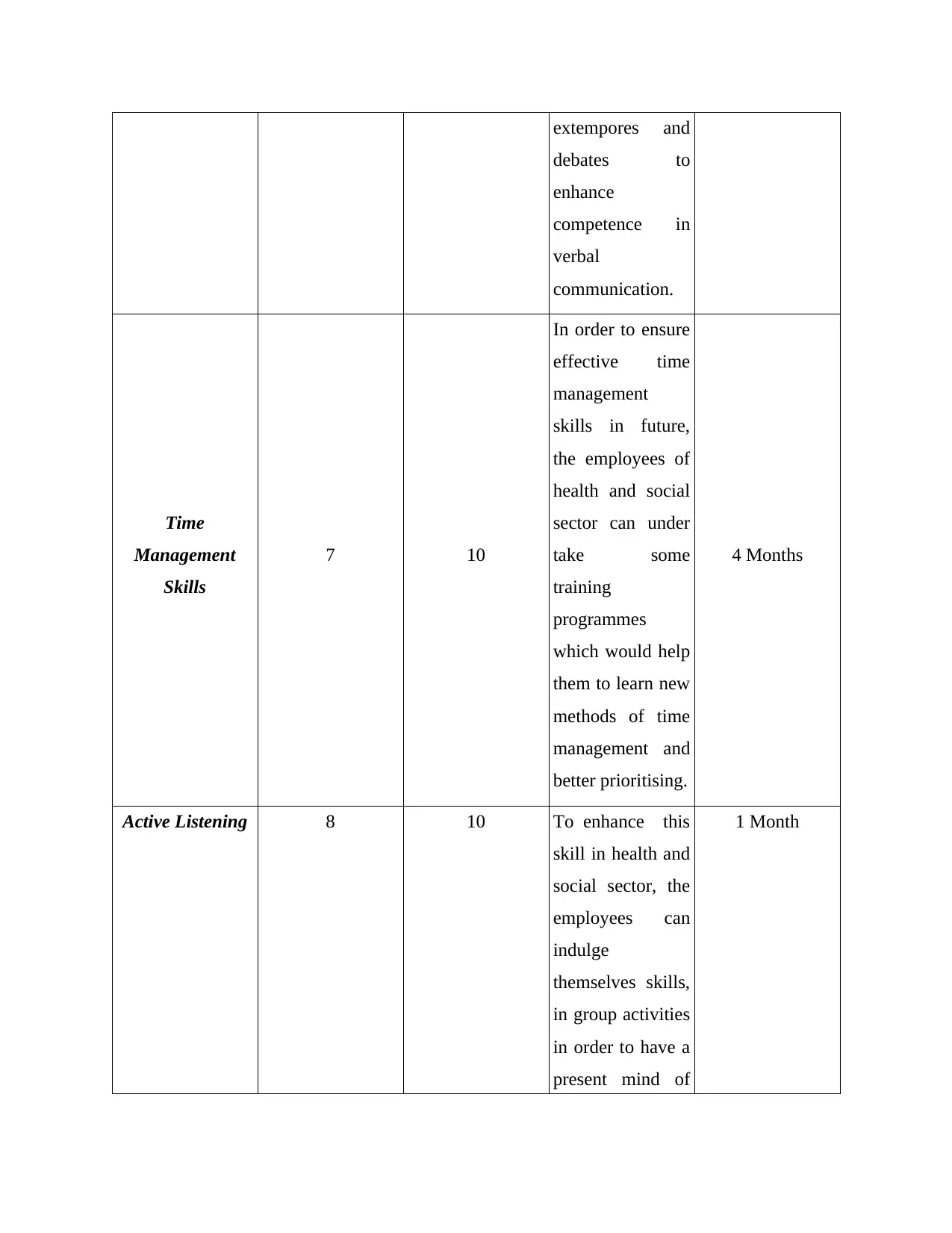
extempores and
debates to
enhance
competence in
verbal
communication.
Time
Management
Skills
7 10
In order to ensure
effective time
management
skills in future,
the employees of
health and social
sector can under
take some
training
programmes
which would help
them to learn new
methods of time
management and
better prioritising.
4 Months
Active Listening 8 10 To enhance this
skill in health and
social sector, the
employees can
indulge
themselves skills,
in group activities
in order to have a
present mind of
1 Month
debates to
enhance
competence in
verbal
communication.
Time
Management
Skills
7 10
In order to ensure
effective time
management
skills in future,
the employees of
health and social
sector can under
take some
training
programmes
which would help
them to learn new
methods of time
management and
better prioritising.
4 Months
Active Listening 8 10 To enhance this
skill in health and
social sector, the
employees can
indulge
themselves skills,
in group activities
in order to have a
present mind of
1 Month
⊘ This is a preview!⊘
Do you want full access?
Subscribe today to unlock all pages.

Trusted by 1+ million students worldwide
1 out of 16
Related Documents
Your All-in-One AI-Powered Toolkit for Academic Success.
+13062052269
info@desklib.com
Available 24*7 on WhatsApp / Email
![[object Object]](/_next/static/media/star-bottom.7253800d.svg)
Unlock your academic potential
Copyright © 2020–2026 A2Z Services. All Rights Reserved. Developed and managed by ZUCOL.





